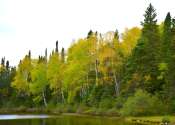Avian ambassadors and tribal perspectives: A bird's eye view of prescribed fire
PSW ecologist and tribal liaison Frank Lake wondered how the birds he grew up with in northeastern California were faring. As a Karuk tribal descendant with Yurok family, Lake has a deep connection to the land and the birds ...









